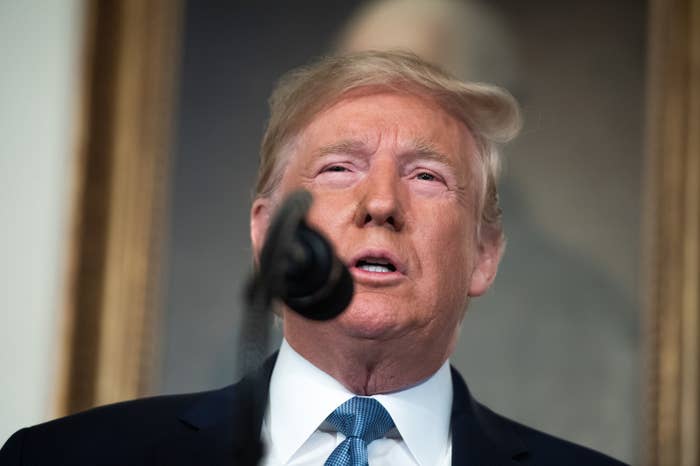
President Donald Trump addressed the nation on Monday in the wake of two mass shootings and called for “unity” and “love.” “We are a loving nation,” he said, focusing his eyes ahead to read a written speech. “Hate has no place in America.”
Four days earlier, he was in Cincinnati, 50 miles from where a gunman this weekend killed nine people, just hours after another man, motivated by a white supremacist hatred of immigrants, killed 22 people at a Walmart in El Paso, Texas. There was no talk of love in Cincinnati, and certainly no talk of unity. Trump demonized America’s “inner cities” and called the Squad — four Democratic women of color in Congress — ”left-wing extremists.” When a scuffle broke out in the audience, as supporters went after protesters carrying an “Immigrants Built America” sign, Trump stood on the stage silently for a full minute and a half, a proud father watching those he raised mete out their brand of justice. “You must have a Democrat mayor,” Trump said. “Come on, law enforcement.” The arena was never so loud again that night as his supporters filled the air with alternating boos and shouts of “USA!”
This was the real Trump — speaking mostly off the cuff and to a crowd of “us” versus them. As the rally stretched into its second hour, Trump said, “The good news is, I don't use the teleprompter too much. If I did, you would have been out of here a long time ago, because it gets very boring when you do the teleprompter deal.”
What Trump did Monday morning was “the teleprompter deal.” The words he said were good and could, in another time, another place, bring some solace to a grieving country: “We are a loving nation and our children are entitled to grow up in a just, peaceful, and loving society,” he said. “Cultural change is hard, but each of us can choose to build a culture that celebrates the inherent worth and dignity of every human life.” But there is no way to divorce the words from the messenger. Those who have watched Trump’s improbable rise and subsequent presidency know to which children he is referring and which human lives he considers inherently worthy.
If you ask people at a Trump rally what brought them there, what they hope to hear the president talk about, the number one answer is almost always the same: immigration. They want to hear about the wall, and how Trump is going to protect us from them. And Trump gives it to them, every time. “The greatest betrayal committed by the Democrats is their support for open borders,” he told the crowd in Cincinnati, “and these open borders would overwhelm schools and hospitals, drain public services, and flood communities with poisonous drugs.” Of course borders can’t do that, but the people who cross them, in Trump’s thinking, can.
Trump had told the crowd, minutes before, that he didn’t want to be controversial that night, and maybe that’s why he depersonalized his reference to immigrants. But it didn’t matter — he and his supporters share a common language, and common codes, and everyone knew what he was saying.
Which is why it was impossible to take the president’s words on Monday at face value. Trump presents himself as the outsider politician who will tell it like it is, doing away with the process and rituals of the office he holds. He holds photo ops with dictators rather than engage with the substance of diplomacy, skips vetting for even his most senior staff, and substitutes inflammatory tweets for press releases. His comments Monday — including his statement that “in one voice, our nation must condemn racism, bigotry, and white supremacy” — were an attempt to play at the presidency, the very designs of which he has rejected.
